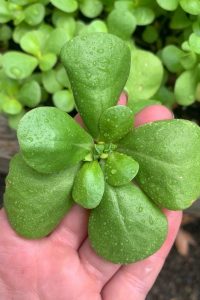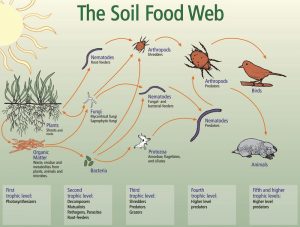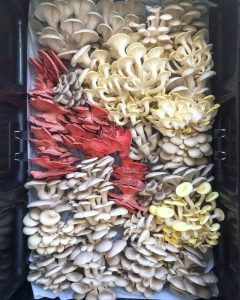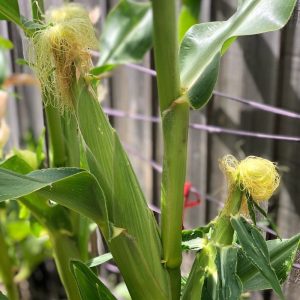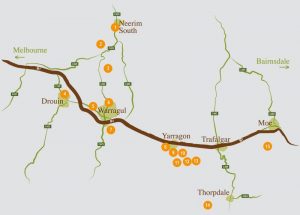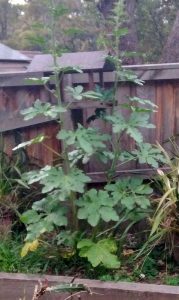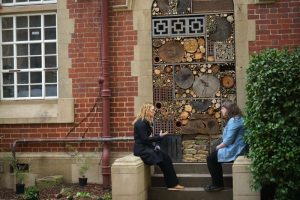Thanks to all the people who have contributed to this week’s newsletter: Cathie Nederveen, Elizabeth Hoey, Jian Liu, Judith Chivers, Kerry Bradford, Megan Goodman, Robin Gale-Baker, Rosie Brock, Sarah Mathers and Vicki Jordan.
What’s wrong with my zucchini? (by Robin Gale-Baker)
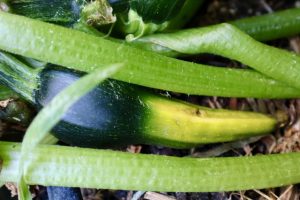 I (Robin) have always assumed that pollination is a once off event for fruit and vegetables. In other words, I’ve always assumed that a fruit has either been pollinated or it has not. But, from my research, it appears that this is not true for all fruit, including zucchini. Rather, a zucchini requires many pollinations (or pollinators) for it to develop properly. One consequence of this is that you may see both healthy and under-developed fruit on the same plant.
I (Robin) have always assumed that pollination is a once off event for fruit and vegetables. In other words, I’ve always assumed that a fruit has either been pollinated or it has not. But, from my research, it appears that this is not true for all fruit, including zucchini. Rather, a zucchini requires many pollinations (or pollinators) for it to develop properly. One consequence of this is that you may see both healthy and under-developed fruit on the same plant.
Here are some links to some relevant articles on the Internet. [Editor: some of these articles refer to ‘squash’. ‘Squash’ is an american term which encompasses both pumpkins and zucchini. Read our fun facts about the taxonomy of pumpkins.]
- Pollination in the garden (University of Nebraska): “Because many seeds form within each fruit and each pollen grain is responsible for the development of a single seed, inadequate pollination results in small or misshapen fruit and lower yields.“
- Summer squash production in California (University of California): “Poor pollination [of squash] results in small young fruit that turn yellow, shrivel, and fall off. Incomplete pollination may also cause misshapen fruit that are unmarketable. “
- Mulch effects on floral resources and fruit production of squash, and on pollination and nesting by squash bees (American Society for Horticultural Science): “Female squash flowers must be visited a minimum of seven times for optimum seed set and fruit development, depending on the crop cultivar and bee species.“
[Editor: since I saw an early draft of Robin’s article, I have been researching the topic as well. Within a typical fruit, there are many seeds and each seed needs to have been pollinated for it to develop. For most flowers, I assume that all the incipient seeds typically get pollinated by the same pollination event but it appears that this is not always the case for plants, such as zucchinis, which have separate female and male flowers. When only some of the incipient seeds within an incipient fruit have been pollinated, the result can apparently be deformed or aborted fruit. This is actually the same phenomenon that I briefly discussed last week in my words about when to harvest sweetcorn.]
Zucchinis, like pumpkins, have separate female and male flowers and are mostly pollinated by bees. Female zucchini flowers that are visited once or twice only by bees or other pollinators will start to turn yellow part way down the fruit or develop a bulbous end nearest the stem (or both). The end furthest from the stem may also begin to rot.
To complicate things, early in the season zucchini plants develop only male flowers. These are recognisable by their thin stem, while the female flower develops a ‘baby’ immature fruit (really an ovary). These early season male flowers are of no use for pollination so you might as well pick them for stuffed zucchini flower recipes.
Given the risk of no, or inadequate, pollination of your zucchinis by nature, it is good if, once female flowers begin to develop, you can offer some help by hand pollinating the female flowers with the pollen from the males.
Hand pollination is best done in the morning when the flowers are open. They generally close in the afternoon.
There are two ways of hand pollinating. First, and possibly the easiest, is to pick a male flower and pull off the petals so that the anther, which will be covered in yellow pollen, is fully exposed. Then use it as a paint brush, smearing the pollen onto the pistil of the open, female flower. The second way is to simply use a fine paint brush to transfer pollen from the male to the female.
If this is too much trouble, an alternative is to fill your garden with biodiverse plantings. Plant as many flowering plants as you can, especially ones that are attractive to bees. While other pollinators do assist, bees, which can enter quite deeply into throated flowers, are the main pollinators of zucchinis.
Finally, note that zucchini is a cultivar (cultivated variety) of the species Cucurbita pepo. This is the same species as the kumi kumi pumpkin, spaghetti squash, the big, orange, inedible fruit that Americans carve coming up to Halloween and some ornamental gourds.
[Read more of Robin’s articles on our website.]
Abbotsford and Carlton Farmers’ Markets are both becoming weekly
Abbotsford Farmers’ Market will be held every Saturday, starting from 12th February.
Carlton Farmers’ Market will be held every Sunday, starting from 13th February. Note the change from Saturdays to Sundays.
A new food swap in Reservoir
At Regent Community Garden, The Regent Centre, 4 Robinson Road, Reservoir. On the 1st Sunday of every month, 1-2pm.
The Regent Community Garden is open every Sunday, midday-3pm and everyone is welcome to go along – no previous gardening experience is necessary!
No you didn’t know (sigh)
Last week, Lucinda Flynn asked “Can tell me the location of the place where all the Italians go to buy their bulk passata tomatoes – I’ve driven past it before (Thornbury, Coburg, Brunswick areas) but can’t remember where.” No on responded but surely someone knows. Email your responses.
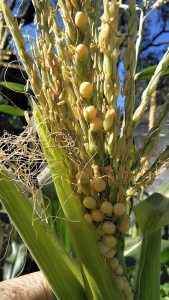
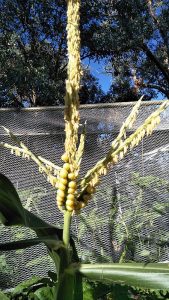 Do you know?
Do you know?
Deformed sweetcorn
Kerry Bradford: “What is happening to my sweetcorn and why (see photos)?” Editor: Kerry and I had a chat and she confirmed that the photos show a few (female) kernels growing in the (male) tassels and that this is happening on multiple plants! Email your responses
Beans not setting fruit
Vicki Jordan: “None of my beans are setting fruit – there are plenty of flowers but no beans! Does anyone know why? Full sun, plenty of bees and the pH is 6.9.” Email your responses
A recipe for fatoush (by Cathie Nederveen)
[Following Jaimie’s article last week about golden purslane, Cathie Nederveen has sent in a Syrian recipe which uses purslane.]
Ingredients
2 handfuls of purslane, torn into small pieces (use lettuce and baby spinach if you can’t find purslane)
5 tomatoes, diced
3 Lebanese cucumbers, diced
1 bunch radishes, tops removed, thinly sliced
1 bunch mint, leaves picked
1 small bunch flat-leaf parsley, leaves picked
2 flat breads, oven dried and crisped, broken up
½ pomegranate, seeds removed (optional)
The dressing
5 lemons, juiced
2 teaspoons sumac
2 garlic cloves, minced
1 teaspoon salt
80 ml (⅓ cup) olive oil
Method
Combine all the dressing ingredients, stir well, and place in the bottom of a large bowl.
Add all the salad ingredients, except the bread, and mix well with hands.
Add the thicker pieces of bread and give them 10 minutes to soak up the dressing.
Just before serving, sprinkle with the remaining smaller bits of crispy bread.
Meg’s garden this month
Clusters of passionvine hoppers (Scolypopa australis) are sheltering from the heat on the underside of the large green leaves of my paulownia tree. Maybe I should be concerned about these sap sucking insects, but they are beautiful with their soft brown, delicate lacy wings. Organic control will be done later in the season when eggs are laid.
The garden has performed well this season, but is now suffering from the heat and my intermittent hand watering. The tomatoes have only just begun to ripen (another late year), with the smaller ‘cherry’ types first. However, the sweetcorn, beans and zucchinis planted back in November have been bountiful, as have the beetroot that we pickled to eat with summer salads (see recipe below).
This month I am:
1. Erecting shade cloth when necessary.
2. Watering each evening.
3. Keeping a close eye out for fruit fly.
4. Collecting seed from dill and other herbs that have gone to seed.
5. Planting more dwarf bean seed.
Pickled beetroot
1 kg fresh beetroot
1 cup sugar
4 cups white vinegar
1 teaspoon ground cinnamon
1 teaspoon mixed spice
about 8 cloves
about 10 peppercorns
1 teaspoon salt
Cook the beetroot in boiling water until just soft. Run under cold water and peel then slice and pack into sterilised jars.
Add all other ingredients to a medium saucepan and bring to the boil. Remove from heat and allow to cool for about 30 minutes. Pour over beetroot (ensuring its covered) and seal.
Keep refrigerated.
[Read more of Meg’s recipes on our website.]
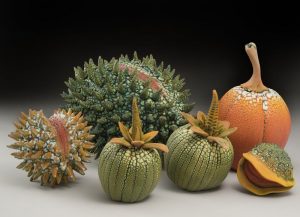 Every newsletter needs a good picture
Every newsletter needs a good picture
Ceramicist William Kidd creates ceramic bowls, vessels, plates, jars and sculptures with the shapes of exotic fantasy fruits and plants.
Some of our articles you might have missed over the last month
- Golden purslane (by Jaimie Sweetman).
- How to get rid of sheep sorrel.
- Our updated guide to local cheese.
- Our updated guide to local chocolate.
- Soil health (by Bev Middleton).
- When to harvest sweetcorn.
What seeds to plant in February
Here is a list (see the planting guide for more detail):
Warm season veggiesBeans |
Cool season veggiesBroccoli |
Leafy greensLettuce |
RootsBeetroot |
OtherChives |
In principle, you can start planting some of the brassicas (broccoli, cauliflower, etc) but perhaps it would be better to wait until March.
Which link was clicked most times in the last newsletter?
The most popular link in the last newsletter was to Jaimie’s articles on our website about various unusual, edible plants (see right sidebar)..
Word of the month – groak
‘Groak’, meaning to stare silently at someone in the hope that they give you some of their food. This is something that my dog does whenever I am either eating or in the kitchen.
Read previous words of the month.
Gardening quote of the month
“Spring is nature’s way of saying, ‘Let’s party!’” by Robin Williams.
Proverb (or phrase) of the month
A nation of shopkeepers. Meaning: either (literally) a description of the English as a people whose power derived from commerce; or (metaphorically) a criticism of the English as a people with little ambition. The phrase originated with the Scottish economist Adam Smith in his Wealth of Nations, published in 1776, where he was using the phrase descriptively (and possibly positively) rather than metaphorically (and disparagingly). It was then reputedly used by Napoleon (who was familiar with Smith’s work) a few years later, where it may or may not have been disparaging.
Another saying sometimes attributed to Napoleon is An army marches on its stomach, meaning either (literally) that it is important for an army to be well-provisioned or (metaphorically) that you must eat properly if you want to perform tasks well.
Read about more food-related proverbs.
Joke (or pun) of the week
Submitted by Rosie Brock.
Q (to a New Zealander): What’s a Hindu?
A (from the New Zealander): Lays eggs.
Covid announcement re upcoming events and activities
The usual caveats apply: some of the events below will probably be cancelled because of Covid and many of the events will be restricted to fully vaccinated people only.
Regular activities over the coming week
Farmers’ markets
- Saturday: Carlton and Coburg.
- Sunday: Alphington and Eltham.
Food swaps
- Saturday: Brunswick East.
Community gardens
- Thursday: Diamond Valley Library (Greensborough), Edible Hub (Hurstbridge) and Whittlesea.
- Friday: West Brunswick.
- Saturday: Links (Lalor) and Thrive (Diamond Creek).
- Sunday: Fawkner Food Bowls, Pentridge and Regent (Reservoir).
- Monday: Whittlesea.
- Tuesday: Watsonia Library.
- Next Wednesday: Span (Thornbury).
Upcoming face-to-face events – not cooking
Sustainability in wine making; Thursday, 10th February, 6-9pm; $27 ($9 per hour); Fitzroy.
Mark Foletta will talk about his sustainable wine making practices and how grapevines fit into the natural environment. The ticket price includes a pizza and wine.
Create your own backyard food forest; Wednesday, 23rd February, 6.40-8pm; free; online.
Jian Liu will share her journey in creating a backyard food forest, including overcoming the challenges faced by many in suburban areas of a shady yard, limited space, poor soil, and pests. Her urban backyard now has around 80 varieties of fruits, heirloom vegetables, flowers, chickens, productive fish pond, worm farms, compost bins and a greenhouse. She will share all her tips and tricks to creating your own productive, sustainable and healthy backyard food forest.
Waste in the wine industry; Thursday, 24th February, 6-9pm; $27 ($9 per hour); Fitzroy.
Marshall Waters will discuss his journey in the wine industry, identify where waste exists in the industry, and how it can be made more sustainable. The ticket price includes a pizza and wine.
Home Harvest twilight picnic; Friday, 25th February, 4-8pm; free; Edendale.
This year’s Home Harvest picnic will be a BYO twilight event. Musical entertainment will be provided by Kimba Griffith Quintet, from Hurstbridge, who will play jazz music. Other planned activities include lawn games, a food swap, a seed library and a largest zucchini competition. Cafe Eden will also be open for coffee and food.
Food forest gardening; Thursday, 17th March, 6.30-8pm; free; Edendale.
Learn tips, tricks and the why, when and how of food forest and urban orchard gardening. Find out what’s involved, do some planning and get some handy resources to help with growing some of your food in an efficient way that mimics nature. Suitable for anyone interested in growing food.
The Herb and Chilli Festival; Saturday, 19th March and Sunday, 20th March, both 10am-5pm; $25; Wandin.
This festival will celebrate all things related to herbs and chillies. There will be stalls, demonstrations, talks, tastings, music and dance. There will be around 80 exhibitors.
Bees wax wraps; Saturday, 19th March, 2-4pm; $50 ($25 per hour); Mount Evelyn.
You will learn all about beeswax, how honeybees make it, its antibacterial properties, and how we can use it to reduce our footprint on the planet. You will make your own beeswax food wrap to take home along with a 100% pure beeswax candle and the skills to make more. Organised by Mt Evelyn Community House.
DIY mushrooms; Sunday, 20th March, 10am-4pm; $165 ($28 per hour); CERES.
Presenter: Buttons Mira from The Mushroomery. You will be shown the secrets to successfully growing mushrooms at home. You will learn the growing methods for oyster and shitake mushrooms, including inoculation and sterilisation, and be introduced to basic mycology. You will undertake practical sessions and learn how to start master cultures.
Starting winter veggies from seed; Sunday, 20th March, 11am-1pm; $30 ($15 per hour); Edendale.
This workshop for beginners will teach you the basics of growing fresh food from seed and will cover: what to plant when; how to make your own seed-raising mix; looking after your seedlings once they’ve sprouted; and troubleshooting common problems such as poor germination, transplant shock and pest attack. Presenter: Jules Jay.
Mushroom cultivation workshop; Sunday, 20th March, 1-4pm; $70 ($23 per hour); Park Orchards.
Learn how to grow mushrooms at home. Gain an overview of the fungi life cycle, the cultivation process, building a mushroom growing chamber, harvesting and storage. Includes: course materials, an oyster mushroom growing kit per person (valued $30), course notes and ongoing support. Organised by Park Orchards Community House.
Wine appreciation (3 sessions); 3 consecutive Mondays, starting, 21st March, 7-8.30pm; $80 ($18 per hour); Brunswick.
Ever thought you’d like to know a little more about wine? Want to find out what “raspberry, oak, tannins on the back palette” really means? Go along and find out from sommelier Kira Janowsky. See, swirl, sniff, sip, savour – you will sample Victorian wines and learn how to recognise the basic structure of wine, and the words to describe it. Organised by Brunswick Neighbourhood House.
In January
- How to make beeswax food wraps; Thursday, 27th January, 6.30-8pm; $60 ($40 per hour); Fitzroy.
- Arts in the garden; Saturday, 29th January, 10am-12.30pm; $12; Hurstbridge.
- Flavours of Coburg food tour; Saturday, 29th January, 10am-1pm; $49 ($16 per hour); Coburg.
- Bakery Hill whisky distillery tour and tasting; Saturday, 29th January, 11am-12.30pm; $64 ($43 per hour); Bayswater North
- Food forest tour and workshop; Saturday, 29th January, 1.30-3pm; $40 ($26 per hour); Camberwell.
In February
- The herbal apprentice (7 sessions); starting on Thursday, 3rd February, 6-8pm; $732 ($52 per hour); Brunswick East.
- Waste becomes blossoms and butterflies; Saturday, 5th February, 10am-12.30pm; free; Hurstbridge.
- Building wicking beds using recycled materials; Saturday, 5th February, 10.30am-midday; $97 ($64 per hour); Abbotsford.
- Beginners compost, worm farms and bokashi bins; Saturday, 5th February, 1-2.30pm; $67 ($44 per hour); Abbotsford.
- Bakery Hill whisky distillery tour and tasting; Sunday, 6th February, 11am-12.30pm; $64 ($43 per hour); Bayswater North
- Introduction to horticulture – 9 session course; every Monday, starting 7th February, each 9.30am-2.30pm; $50 for all 9 sessions; Edendale.
- Sustainability in wine making; Thursday, 10th February, 6-9pm; $27 ($9 per hour); Fitzroy.
- Step to employment in horticulture (9 sessions); on 9 consecutive Fridays starting 11th February, each 9.30am-3pm; free; Fawkner.
- Bakery Hill whisky distillery tour and tasting; Friday, 11th February, 5.30-7pm; $64 ($43 per hour); Bayswater North
- Growing mushrooms at home; Saturday, 12th February, 10am-12.30pm; $95 ($38 per hour); Alphington.
- Flavours of Coburg food tour; Saturday, 12th February, 10am-1pm; $49 ($16 per hour); Coburg.
- Beginners backyard beekeeping; Saturday, 12th February, 10am-3pm; $220 ($44 per hour); CERES.
- Planning your autumn vegetable garden; Tuesday, 15th February, 1-2.30pm; free; Coburg.
- Wine workshop for enthusiasts; Tuesday, 15th February, 7-8.30pm; $40 ($26 per hour); Hawthorn.
- Complete urban farmer (14 sessions); weekly, starting Thursday, 17th February, 9am-3pm; $880 ($10 per hour); CERES.
- The joy of backyard chooks; Thursday, 17th February, 6.30-9pm; $50 ($20 per hour); Bulleen Art and Garden (BAAG).
- Bakery Hill whisky distillery tour and tasting; Friday, 18th February, 5.30-7pm; $64 ($43 per hour); Bayswater North
- Gardening in small spaces; Saturday, 19th February, 10am-3pm; $115 ($23 per hour); CERES.
- Make a blue-banded bee apartment block; Saturday, 19th February, 10.30am-midday; $65 ($44 per hour); Abbotsford.
- Healthy productive compost and worms; Sunday, 20th February, 9.30am-12.30pm; $50 ($17 per hour); Bulleen Art and Garden (BAAG).
- Waste in the wine industry; Thursday, 24th February, 6-9pm; $27 ($9 per hour); Fitzroy.
- Home Harvest twilight picnic; Friday, 25th February, 4-8pm; free; Edendale.
- Pop up garlic farmer (9 month course); a 9 month course starting on Saturday, 26th February.
- Introduction to beekeeping; Saturday, 26th February, 9.30am-4.30pm; $225 ($25 per hour); Blackburn North.
- Flavours of Coburg food tour; Saturday, 26th February, 10am-1pm; $49 ($16 per hour); Coburg.
- Growing and cooking with bushfoods; Saturday, 26th February, 10am-3pm; $115 ($23 per hour); CERES.
- Beekeeping workshop; Saturday, 26th February, 2.30-5pm; $85 ($34 per hour); Brunswick East.
- Beeswax wraps; Sunday, 27th February, 10am-midday; $55 ($28 per hour); Park Orchards.
In March
- Vegetable seed saving; Thursday, 3rd March, 6.30-8pm; free; Edendale.
- Flavours of Coburg food tour; Saturday, 5th March, 10am-1pm; $49 ($16 per hour); Coburg.
- Grow your own native edibles; Saturday, 5th March, 1-2.30pm; $61 ($41 per hour); Abbotsford.
- Veggie gardening for beginners; Thursday, 10th March, 6.30-9pm; $55 ($22 per hour); Bulleen Art and Garden (BAAG).
- Beginning beekeeping course; Saturday, 12th March, 9am-3.30pm; $245 ($41 per hour); Edendale.
- Growing mushrooms at home; Sunday, 13th March, 10am-12.30pm; $95 ($38 per hour); Alphington.
- Complete urban farmer (14 sessions); weekly, starting Wednesday, 16th March, 9am-3pm; $880 ($10 per hour); CERES.
Upcoming face-to-face events – cooking
Ladies day in the kitchen; Thursday, 17th March, 9.30am-midday; $32 ($13 per hour); Yarra Glen.
Jill Bowen Hess will discuss grazing food including BBQs, summer meals and picnics. Organised by Yarra Glen Living & Learning Centre.
Artisan bread making; Sunday, 20th March, 8am-2pm; $220 ($37 per hour); Abbotsford.
What you will learn: experimenting with bread; the bread baking process with each step explained; and how to replicate the process at home. What you will get: 1 kilo of organic flour to take home; and savory calzone for lunch, which you make, eat and take home. The focus will be on ciabatta and turkish breads. Organised by Convent Bakery.
Passata day; Sunday, 20th March, 10am-1pm; $15 ($5 per hour); Watsonia.
Learn how to make and bottle/jar passata. Followed by a pasta lunch. Organised by Watsonia Neighbourhood House.
Feta and haloumi cheese making; Sunday, 20th March, 10am-4pm; $170 ($28 per hour); CERES.
What you will learn: how to make your own fetta and haloumi cheese; how to make ricotta cheese; and about different cheeses. Presenters: Janet Clayton and Charlene Angus from Cheeselinks.
Truffle workshop at Ratio Cocoa Roasters; Sunday, 20th March, 11am-12.30pm; $75 ($50 per hour); Brunswick.
A behind-the-scenes tour of the 10 step chocolate making process at Ratio Cocoa Roasters. Followed by a guided chocolate tasting. Then make your own milk or dark truffles with a selection of toppings.
The art of salad making; Tuesday, 22nd March, 7-8.30pm; $40 ($26 per hour); Hawthorn.
Join them in this hands-on salad making workshop using seasonal produce. You will learn about salads that deliver big, punchy flavours and homemade sauces. Organised by Hawthorn Community House.
In January
- Beginners cheese making class; Saturday, 29th January, 10am-3pm; $180 ($36 per hour); Thomastown.
- Beginners bread making; Sunday, 30th January, 8am-2pm; $220 ($37 per hour); Abbotsford.
- Cannoli making masterclass; Sunday, 30th January, 11am-1pm; $106 ($53 per hour)); Northcote.
In February
- Rosa’s Friday traditional Italian cooking class; Friday, 4th February, 6-10pm; $155 ($39 per hour); Bundoora.
- Tortelloni and ravioli class; Saturday, 5th February, 10am-1.30pm; $125 ($36 per hour); Thomastown.
- Rosa’s Saturday traditional Italian cooking class; Saturday, 5th February, 10.30am-2.30pm; $155 ($39 per hour); Bundoora.
- Beginners bread making; Sunday, 6th February, 8am-2pm; $220 ($37 per hour); Abbotsford.
- Mozzarella making class; Sunday, 6th February, 10am-midday; $120 ($60 per hour); Thomastown.
- An Asian street food feast; Sunday, 6th February, 10am-3pm; $180 ($40 per hour); Panton Hill.
- Rosa’s Sunday traditional Italian cooking class; Sunday, 6th February, 10.30am-2.30pm; $155 ($39 per hour); Bundoora.
- The ultimate biscuit class; Tuesday, 8th February, 10am-3pm; $160 ($32 per hour); Blackburn.
- Valentine’s French macaron masterclass; Friday, 11th February, 6-8.30pm; $106 ($42 per hour); Cremorne.
- Passata party vol. 2; Saturday, 12th February, 10am-4pm; free; Coburg North.
- Valentine’s pizza masterclass; Sunday, 13th February, 11am-1pm; $117 ($59 per hour); Northcote.
- Rosa’s Friday traditional Italian cooking class; Friday, 18th February, 6-10pm; $155 ($39 per hour); Bundoora.
- Sourdough bread baking; Saturday, 19th February, 9am-5pm; $180 ($23 per hour); CERES.
- Sourdough bread workshop; Saturday, 19th February, 9-11.30am; $185 ($74 per hour); Brunswick East.
- Rosa’s Saturday traditional Italian cooking class; Saturday, 19th February, 10.30am-2.30pm; $155 ($39 per hour); Bundoora.
- Vegan cooking Italian style; Sunday, 20th February, 10am-3pm; $115 ($23 per hour); CERES.
- Rosa’s Sunday traditional Italian cooking class; Sunday, 20th February, 10.30am-2.30pm; $155 ($39 per hour); Bundoora.
- Truffle workshop at Ratio Cocoa Roasters; Sunday, 20th February, 11am-12.30pm; $75 ($50 per hour); Brunswick.
- Beginners bread making; Sunday, 20th February, 8am-2pm; $220 ($37 per hour); Abbotsford.
- The ultimate biscuit class; Tuesday, 22nd February, 10am-3pm; $160 ($32 per hour); Blackburn.
- Sourdough breadmaking workshop; Wednesday, 23rd February, 10am-1pm; $90 ($30 per hour); Surrey Hills.
- Demystifying bread; Thursday, 24th February, 6.30-9pm; $60 ($24 per hour); Park Orchards.
- Become a junior chocolatier; Saturday, 26th February, 10-10.45am; $40 ($53 per hour); Yarra Glen.
- Chocolate discovery class; Saturday, 26th February, 11.30am-12.30pm; $48 ($48 per hour); Yarra Glen.
- Growing and cooking with bushfoods; Saturday, 26th February, 10am-3pm; $115 ($23 per hour); CERES.
- Beginners bread making; Sunday, 27th February, 8am-2pm; $220 ($37 per hour); Abbotsford.
- Gluten free gnocchi making masterclass; Sunday, 27th February, 11am-1pm; $106 ($53 per hour); Northcote.
In March
- Italian cooking; Thursday, 3rd March, 6-8pm; $70 ($35 per hour); Surrey Hills.
- Rosa’s Friday traditional Italian cooking class; Friday, 4th March, 6-10pm; $155 ($39 per hour); Bundoora.
- Rosa’s Saturday traditional Italian cooking class; Saturday, 5th March, 10.30am-2.30pm; $155 ($39 per hour); Bundoora.
- Beginners bread making; Sunday, 6th March, 8am-2pm; $220 ($37 per hour); Abbotsford.
- Rosa’s Sunday traditional Italian cooking class; Sunday, 6th March, 10.30am-2.30pm; $155 ($39 per hour); Bundoora.
- Men in the kitchen; Monday, 7th March, 6.30-9pm; $32 ($13 per hour); Yarra Glen.
- Sri Lankan cooking class; Tuesday, 8th March, 6-9pm; $90 ($30 per hour); Surrey Hills.
- Italian cooking; Thursday, 10th March, 6-8pm; $70 ($35 per hour); Surrey Hills.
- Middle Eastern cooking; Friday, 11th March, 6.30-9.30pm; $65 ($22 per hour); Park Orchards.
- Kitchen garden sessions #1; Saturday, 12th March, 10am-midday; $15; Coburg.
- Beginners bread making; Sunday, 13th March, 8am-2pm; $220 ($37 per hour); Abbotsford.
- The ultimate biscuit class; Tuesday, 15th March, 10am-3pm; $160 ($32 per hour); Blackburn.
In Richmond
- Dumpling party; Thursday, 27th January, 6.30-8.30pm; $111 ($56 per hour).
- Pizza making party; Friday, 28th January, 2-4pm; $127 ($64 per hour).
- Indian cooking master class; Friday, 28th January, 6.30-9.30pm; $168 ($56 per hour).
- Dumpling party; Saturday, 29th January, 10am-midday; $111 ($56 per hour).
- Chinese cooking master class; Saturday, 29th January, 2-5pm; $168 ($56 per hour).
- Asian cooking with parents and kids; Sunday, 30th January, 2-4pm; $91 ($46 per hour).
- Vegan cooking master class; Sunday, 30th January, 6.30-9.30pm; $189 ($63 per hour).
- Dumpling party; Sunday, 30th January, 10am-midday; $111 ($56 per hour).
- Dumpling party; Thursday, 3rd February, 6.30-8.30pm; $111 ($56 per hour).
- Japanese cooking master class; Friday, 4th February, 2-5pm; $189 ($63 per hour).
- Chinese cooking master class; Friday, 4th February, 6.30-9.30pm; $168 ($56 per hour).
- Dumpling party; Saturday, 5th February, 10am-midday; $111 ($56 per hour).
- Thai cooking master class; Saturday, 5th February, 2-5pm; $168 ($56 per hour).
- Street food of Asia; Saturday, 5th February, 6.30-9pm; $168 ($67 per hour).
- Dumpling party; Sunday, 6th February, 10am-midday; $111 ($56 per hour).
- Vietnamese cooking master class; Sunday, 6th February, 2-5pm; $168 ($56 per hour).
- Indian cooking master class; Sunday, 6th February, 6.30-9.30pm; $168 ($56 per hour).
- Gnocchi in tutta l’Italia; Tuesday, 8th February, 6.30-10.30pm; $105 ($26 per hour).
- Dumpling party; Thursday, 10th February, 6.30-8.30pm; $111 ($56 per hour).
- Cooking with Australian ingredients master class; Friday, 11th February, 2-5pm; $189 ($63 per hour).
- Japanese cooking master class; Friday, 11th February, 6.30-9.30pm; $189 ($63 per hour).
- Dumpling party; Saturday, 12th February, 10am-midday; $111 ($56 per hour).
- Chinese cooking master class; Saturday, 12th February, 2-5pm; $168 ($56 per hour).
- Vietnamese cooking master class; Saturday, 12th February, 6.30-9.30pm; $168 ($56 per hour).
- Dumpling party; Sunday, 13th February, 10am-midday; $111 ($56 per hour).
- Asian cooking with parents and kids; Sunday, 13th February, 2-4pm; $91 ($46 per hour).
- Korean cooking master class; Sunday, 13th February, 6.30-9.30pm; $168 ($56 per hour).
- Dumpling party; Thursday, 17th February, 6.30-8.30pm; $111 ($56 per hour).
- Street food of Asia; Friday, 18th February, 2-4.30pm; $168 ($67 per hour).
- Thai cooking master class; Friday, 18th February, 6.30-9.30pm; $168 ($56 per hour).
- Dumpling party; Saturday, 19th February, 10am-midday; $111 ($56 per hour).
- Indian cooking master class; Saturday, 19th February, 2-5pm; $168 ($56 per hour).
- Japanese cooking master class; Saturday, 19th February, 6.30-9.30pm; $189 ($63 per hour).
- Dumpling party; Sunday, 20th February, 10am-midday; $111 ($56 per hour).
- Vegan cooking master class; Sunday, 20th February, 6.30-9.30pm; $189 ($63 per hour).
- Dumpling party; Thursday, 24th February, 6.30-8.30pm; $111 ($56 per hour).
- Sicilian food; Thursday, 24th February, 6.30-10.30pm; $105 ($26 per hour).
- Pizza making party; Friday, 25th February, 2-4pm; $127 ($64 per hour).
- Greek cooking master class; Friday, 25th February, 6.30-9.30pm; $168 ($56 per hour).
- Dumpling party; Saturday, 26th February, 10am-midday; $111 ($56 per hour).
- Mexican cooking master class; Saturday, 26th February, 2-5pm; $168 ($56 per hour).
- Spanish cooking master class; Saturday, 26th February, 6.30-9.30pm; $168 ($56 per hour).
- Dumpling party; Sunday, 27th February, 10am-midday; $111 ($56 per hour).
- Cooking with Australian ingredients master class; Sunday, 27th February, 2-5pm; $189 ($63 per hour).
- Italian cooking master class; Sunday, 27th February, 6.30-9.30pm; $168 ($56 per hour).
- Dumpling party; Thursday, 3rd March, 6.30-8.30pm; $111 ($56 per hour).
- Nonna’s comfort food (Italian); Thursday, 3rd March, 6.30-10.30pm; $105 ($26 per hour).
- Japanese cooking master class; Friday, 4th March, 2-5pm; $189 ($63 per hour).
- Chinese cooking master class; Friday, 4th March, 6.30-9.30pm; $168 ($56 per hour).
- Dumpling party; Saturday, 5th March, 10am-midday; $111 ($56 per hour).
- Thai cooking master class; Saturday, 5th March, 2-5pm; $168 ($56 per hour).
- Street food of Asia; Saturday, 5th March, 6.30-9pm; $168 ($67 per hour).
- Dumpling party; Sunday, 6th March, 10am-midday; $111 ($56 per hour).
- Vietnamese cooking master class; Sunday, 6th March, 2-5pm; $168 ($56 per hour).
- Indian cooking master class; Sunday, 6th March, 6.30-9.30pm; $168 ($56 per hour).
- Gnocchi in tutta l’Italia; Tuesday, 8th March, 6.30-10.30pm; $105 ($26 per hour).
- Dumpling party; Thursday, 10th March, 6.30-8.30pm; $111 ($56 per hour).
- The cuisine of Central Italy; Thursday, 10th March, 6.30-10.30pm; $105 ($26 per hour).
- Cooking with Australian ingredients master class; Friday, 11th March, 2-5pm; $189 ($63 per hour).
- Japanese cooking master class; Friday, 11th March, 6.30-9.30pm; $189 ($63 per hour).
- Dumpling party; Saturday, 12th March, 10am-midday; $111 ($56 per hour).
- Chinese cooking master class; Saturday, 12th March, 2-5pm; $168 ($56 per hour).
- Vietnamese cooking master class; Saturday, 12th March, 6.30-9.30pm; $168 ($56 per hour).
- Dumpling party; Sunday, 13th March, 10am-midday; $111 ($56 per hour).
- Asian cooking with parents and kids; Sunday, 13th March, 2-4pm; $91 ($46 per hour).
- Korean cooking master class; Sunday, 13th March, 6.30-9.30pm; $168 ($56 per hour).
- A seafood feast; Tuesday, 15th March, 6.30-10.30pm; $105 ($26 per hour).

